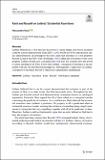Files in this item
Kant and Russell on Leibniz’ existential assertions
Item metadata
| dc.contributor.author | Rossi, Alessandro | |
| dc.date.accessioned | 2021-04-20T09:30:09Z | |
| dc.date.available | 2021-04-20T09:30:09Z | |
| dc.date.issued | 2021-04-19 | |
| dc.identifier | 272684037 | |
| dc.identifier | 625155df-58b2-489c-a308-4980b18df347 | |
| dc.identifier | 000641244000002 | |
| dc.identifier | 85111952759 | |
| dc.identifier.citation | Rossi , A 2021 , ' Kant and Russell on Leibniz’ existential assertions ' , Sophia , vol. First Online . https://doi.org/10.1007/s11841-021-00831-x | en |
| dc.identifier.issn | 0038-1527 | |
| dc.identifier.uri | https://hdl.handle.net/10023/23060 | |
| dc.description.abstract | Leibniz believed in a God that has the power to create beings and whose existence could be a priori demonstrated. Kant (KrV, A 592-602/B 620-630) objected that similar demonstrations all presuppose the false claim that existence is a real property. Russell (London and New York: Routledge, 1992) added that if existence were a real property Leibniz should have concluded that God does not actually have the power to create anything at all. First, I show that Leibniz’ conception of existence is incompatible with the one that Russell presupposes. Subsequently, I argue that on Leibniz’ conception of existence Russell’s objection is immediately undermined. | |
| dc.format.extent | 21 | |
| dc.format.extent | 330552 | |
| dc.language.iso | eng | |
| dc.relation.ispartof | Sophia | en |
| dc.subject | Leibniz | en |
| dc.subject | Existence | en |
| dc.subject | Kant | en |
| dc.subject | Russell | en |
| dc.subject | Onotological arguement | en |
| dc.subject | B Philosophy (General) | en |
| dc.subject | T-NDAS | en |
| dc.subject | NIS | en |
| dc.subject.lcc | B1 | en |
| dc.title | Kant and Russell on Leibniz’ existential assertions | en |
| dc.type | Journal article | en |
| dc.contributor.institution | University of St Andrews. Philosophy | en |
| dc.contributor.institution | University of St Andrews. Arché Philosophical Research Centre for Logic, Language, Metaphysics and Epistemology | en |
| dc.identifier.doi | https://doi.org/10.1007/s11841-021-00831-x | |
| dc.description.status | Peer reviewed | en |
This item appears in the following Collection(s)
Items in the St Andrews Research Repository are protected by copyright, with all rights reserved, unless otherwise indicated.

